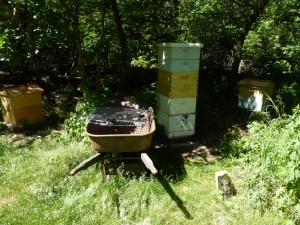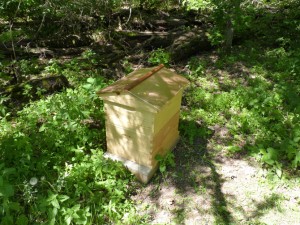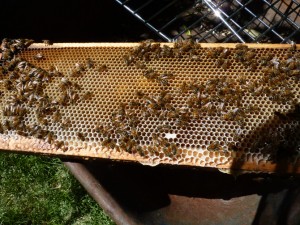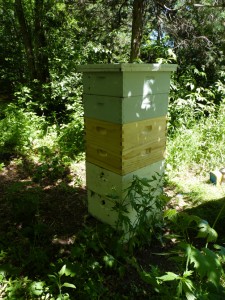Beltane Waning Planting Moon
Hive inspections today. A rhythm to the process has begun to set in, not jelled quite yet, but getting there. In the honey house, the converted machine shed where we parked our various internal combustion contraptions, off come the hat, the gloves, sweatshirt. Pick up the smoker, toss two handfuls of hamster bedding in it and light. Open the package of dense cotton clumps, tear off a piece or two and shove them into the side of the smoker, being careful to keep the flame going. Pick out a square of cut-up cotton cloth and set it on fire next to the dense cotton, hit the bellows a couple of times to make sure the thing gets stoked.
Open the package of dense cotton clumps, tear off a piece or two and shove them into the side of the smoker, being careful to keep the flame going. Pick out a square of cut-up cotton cloth and set it on fire next to the dense cotton, hit the bellows a couple of times to make sure the thing gets stoked.
(bee yard)
Put on the bee suit, being careful to tighten the velcro around the wrists. At this point it would also make sense to tuck my pants into my socks, but it seems I still require the sight of a bee on the ground. Then I do it.
Pick up the hive tool and stick it in my back pocket, close and pick up the smoker and head out to the package colony, #3. I do them in the order of orneriness. The package bees are very calm, the divided colony less so and the parent colony, #1, can be downright aggressive. This way I leave fewer excited bees in the air as I get closest to the end.
After a little smoke under the copper top on #3 and dash at the entrance, I lift the copper top off and put it standing up against a baby oak tree nurtured by Jon. This reveals the empty hive body that protects the syrup bucket positioned upside down over the opening in the hive box cover. Today it was not significantly down so I left it alone after removing it. A little more smoke and the hive box cover comes off, the frames and foundations of this new colony now are visible. Being careful to keep the frames over the hive box (in case the queen is on the frame and should fall off she’ll land back in the hive), I look at it with the sun to my back, then flip it over and do the same with the other side. I find larvae, so we’re still queen right and work has proceeded on several frames, but there’re no where near the 80% needed to add another hive box. (colony 3)

This colony had eaten through the pollen patty I provided, so I had to interrupt my visit with a trip inside, down in the basement to get a pollen patty from the small refrigerator we have down stairs. Made me think it might be nice to have a small fridge in the honey house. I could keep pollen patties in there along with water and Sharps.
Looking at the bees at work, once you get over your fear of getting stung, counts as one of the pleasures of bee-keeping at a hobby level, so I indulge myself. Nursery bees go head first into comb to clean it out, or add more height, do something hygienic for a larvae. Worker bees are adding pollen to combs and honey, too, creating a food supply around the colony’s nursery, ensuring food for the long haul. Close it up and move on to
#2 has a lot more bees. With its copper top off the hive box cover has a solid mass of bees. The new hive box, on top of the divided box with the new, marked queen, has a number of frames with drawn out comb, but several are still empty. This means the colony has plenty of room and I see no swarm cells on the top box. Should I reverse them? I couldn’t remember. I don’t, figuring that the crowded bees are in the divided box and the more roomy box is on top. Since the queen tends to move up, it makes more sense to me to leave this hive in the status quo. Everything gets put back together in the reverse order from which it was removed.
Colony #3, the package Mark and I hived last April in his surplus equipment he loaned me to get started, is mature. It has a year plus old queen still in her peak fertility years, a full contingent of workers, two hive boxes with drawn out comb, larvae and plenty of food for the colony. From a honey production perspective this is the point of the whole process. As I lift the outside hive cover, metal topped to protect the colony from the elements, there are not as many bees here as there were in #2. That makes sense because the hive cover here is over a honey super, not directly over a hive box.
Just by looking I can see the honeycomb drawn out on almost all of the 10 frames in the honey super. This is exciting. When I lift this honey super off, it’s heavy. Heavy with honey. More smoke. The second honey super does not have as much honey because they had to draw out comb for it, but there is still a substantial amount, maybe half of the frame sides. It comes off, lighter than the top one.
with honey. More smoke. The second honey super does not have as much honey because they had to draw out comb for it, but there is still a substantial amount, maybe half of the frame sides. It comes off, lighter than the top one.
Below the honey super is the queen excluder. It has bees all over it and experienced bee keepers assure that many times the queen, just out of contrariness, will be on the underside. So, I’m careful to lift the excluder over the hive. I look for the queen but cannot see her. She could have been right in front of me and I’m not sure I would have known. She’s longer, that’s the most obvious difference.
(a full frame of honey)
Today colony 3 seems calmer. Maybe it’s me, getting more acquainted with the work. I can’t tell. These two hive boxes are full of bees. The U says to reverse them every 7-10 days, so I’m reversing them. What do I know at this point? Both the hive boxes are heavy two with stored honey, larvae and bees. Since I’m not turning pink and sweat is not blinding me as I make every move, I’m slower, use my legs. Not a problem. After reversing them and checking for swarm cells (maybe, but there’s not much I can do at this point except put on more honey supers which I have with me.), I put the honey supers back, starting with a new pair just constructed by Kate and beautiful to see. This means I have chosen, not sure why, to put the heaviest box on top. This could get unwieldy pretty fast. (see picture) The hive box cover goes on over the top honey super, the metal covered top and another hive inspection is in the books.
Hilo, who lay at the edge of the bee yard as I worked, and I go back to the honey house, open up the smoker so it can burn out, put the hive tool away, hang up the bee  suit and head out to the chair sitting on the bricks in front of the honey house. I finish off the Sharps, look at the trees, marveling at these unique living beings and watch a sparrow gathering material for a nest. Until next week.
suit and head out to the chair sitting on the bricks in front of the honey house. I finish off the Sharps, look at the trees, marveling at these unique living beings and watch a sparrow gathering material for a nest. Until next week.
(new honey supers on colony 3)
